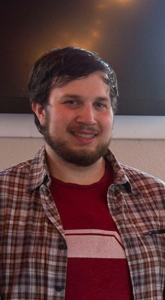
Philadelphia, January 4, 1992
I could paint his face from memory. Crinkled and putty-colored and as aggravated as a tub of stucco. Right now, he’s grimacing at the newspaper, holding the front page a foot from his scowl and craning his neck all the way back like whatever he’s reading smells worse than the truth. He takes zero notice as I pull up in front of the building. The doorman tells him I’m here. Waiting. I nudge a few cans of turpentine under the seat and pick a dried flake of magnesium-yellow paint off the steering wheel. He walks over to the passenger side and signals for me to roll down the window. Bored circles in the air. Like he’s swinging a noisemaker with nothing at all pleasant to announce. His laser-blue eyes scan me over like a high-tech security device. I know what he sees.
He shifts his little black reading glasses up the bridge of his nose and sniffs. “We’ll take my car.” Then he backs away, waving me on with the paper. No hello, no smile, just a cue to move forward. With caution.
I wish I had my own daily rag to brandish, but I don’t. From the rearview mirror, I see him checking his watch.
“Traffic?” His eyes still on the time.
“There was tunnel congestion and then some idiot—”
“—Let’s just go. I don’t wanna be late.”
The keys to his pale yellow Caddy land in my fist. I straighten a kink in my spine and get in. The air is old, fraught with evidence of cigarette butts and stale cherry Life Savers. I move up the driver’s seat and adjust the mirrors.
“Don’t forget to put those back the way you found them. It always screws me up whenever you or your mother drive this car.”
“We can go in mine.”
“No.” He stops himself from any further comment. There are so few things he resists saying that I take his reserve as kindness.
The light turns red, and I hit the brake pedal. The Caddy jerks to a stop.
He tenses up against the worn leather.
“Easy on your old man, little girl. Easy.” The weak scaffolding of his faded plaid jacket barely props him up anymore. One false move and something might shake loose from his rafters—his Sunday jacket deconstructing. “You’re already grinning and you haven’t won anything yet.”
“I guess I’m just looking forward to getting there. Has it changed much?”
He belches softly and stares out at the road. “Everything changes, little girl. Everything. Believe me.”
He’s probably right. There was a time when he was able to smile back.
We arrive at the racetrack and make our way to the upper circle of the Philly Park clubhouse, a custom he’s kept from the days when even Mom enjoyed it here. She preferred not rubbing elbows with the riffraff and felt the dining room was a more sophisticated experience. A penguin-ed waiter escorts us over to a table where ice water and leatherette menus mark our places.
I don’t consult the menu; I know exactly what I want. “I’ll have the Caesar, please.”
The server’s barbed eyebrows spike at my good choice.
“And gimme a cup of black coffee, would ya? I’ll get some food later.” The menu gets pushed back toward our tuxedoed friend as the coffee is poured.
Coffee is the primer, a first coat before all the fiery layers of whiskey go down. He won’t get any food later. He dumps half the cream in his cup, his spoon clanging as if calling for order in all the cloudiness. One sip and he summons the waiter again.
“You call this coffee? Ballentine’s straight up, please.”
A raw egg cracks into the wooden bowl on top of the cart and my thoughts converge on all the things about to be tossed into the air in front of me. The big, creamy Caesar arrives like a long-awaited rendezvous, but I keep my mouth shut, not wanting to spoil an old hunger.
“Here. Put this on the Tunisian trainer, would ya?” He pulls two hundred-dollar bills out of his front jacket pocket, then a third.
I take the money from his hand, brushing the frayed edges of his sleeves, limp tracks of thread circling his wrist. He always dressed impeccably, but these days the slickness and preening are missing.
“What’s the horse’s name?” I get up to place the bet, still troubled by his cuffs.
He hijacks a minute before answering me, filling the space with ploys of status and guessing games. The more presumptuous his mood, the longer it takes him to respond as if he’s only stating the obvious. Then he tilts his drugstore specs toward the tip of his bloated nose. “Bet the one with the Tunisian trainer.”
I skim through the racing form and try to identify anything particularly North African in the jumble of rare names and tricky statistics. I think he gets a kick out of watching me scramble.
“I don’t know which one you’re talking about, and all bets have to be posted in five minutes. So just tell me the name of the horse, please.”
“And this is my brightest kid….” He burps in mild disgust.
I storm off with my order—but not to the ticket window. Instead, I make my way to the ladies’ room, identified by a horse head with Mares written underneath, and proceed toward the stalls. Three hundred dollars. All that money thrown away on a horse race. Three bills delivered like a direct threat, each zero poking fun at my struggle to make the rent. Who gives a damn about Tunisian trainers? I’ve got three hundred dollars and two minutes before posting. Screw it.
A bony woman edges her way past me, tucking her tickets into a flesh-colored purse. I shove my bills to the bottom of my pocket, splash myself with cool water from the dingy sink and check my reflection in the mirror. Those are his brooding eyes, half-closed as if scrutinizing some lost detail. The same reckless lips and protruding chin too. It’s his face, all right—the one that keeps showing up in my self-portraits—the ones I never finish because of the way they stare back.
He’s holding court at the table, his gaze fixed on the racing form, his drink severely diminished. I won’t put up with any more punishing laser scans or pop quizzes on Arabian horsemen. I take a seat and shoot him a disapproving look—one I’ve appropriated from Mom—then emphasize my choice of beverage to the passing waiter.
“Hot coffee, please.”
“And another whiskey for her old man,” Dad counters.
“And they’re off!” A piercing voice pipes in over the loudspeakers. Ten thoroughbreds speed out of the gate, kicking up a great wake of mud around each miniature man in bright-colored clothing. It’s de Kooning through a kaleidoscope; hues and forms ricochet until I can’t make out anything, just a vast, splashy tableau stretching in front of me.
Trixie Dipper, Day’s a-Waitin,’ Captain of My Heart, Tam Tam, Zeus’ Fire, Heaven’s Door. A breathless string of non-sequiturs flies from the announcer at monotonous hyper-speed. Names and numbers and necks and furlongs.
“…Deep in the stretch…coming round the clubhouse turn and heading for home…and it’s number two, Tam Tam, by a nose!”
I snap out of my Abstract Impressionist reverie. “Damnit. I thought Day’s a-Waitin’ had it pegged.”
“Day’s a-Waitin’? Did you say Day’s a-Waitin’?” His program slaps the table. “You put my three hundred bucks on that piece-a-shit horse after I expressly told you who’d win?”
“Sorry, Dad, but you never actually said—”
“—My dear, could you tell me who the trainer is for Tam Tam?” He aims his crossword pen at the racing form, tapping it twice. Tap tap. I follow his pointer and read the small print next to the horse’s name: Azzedine Bahbar.
“Sounds rather Tunisian, don’t you think?” He dismissively waves me off before hoisting his glasses back into position and studying the next race.
I spend the next few races devoid of interest, searching here and there for horses with names I can relate to: Delusion’s Child or Daughter ‘till the Death. But all I find are names like Warrior King and Shifty Dancer. It’s not a good day for the dark horse.
He collects money and whiskey in equal turns, madly scribbling notes in the margins of the form. There’s a pattern in how he picks his runners: He only bets the horses with a history of excuses. So if a horse ran fourth in its previous race, but the jockey wasn’t whipping the horse’s left side, then that’s reason enough for the horse to have lost. But whipped correctly, that same horse could win, in which case, he’ll bet on him. Or if the horse lost because it rained, then he’d probably do better with no mud. A sunny day could make a difference. He mutters things like, “How the hell could the horse win with that rider? Today, he’s got his usual boy.” And the margins get filled with cryptic calculations: rain + sub rider, ran 2nd, cold = trot. There’s always a possibility a runner can win, given a second chance. He’s betting the excuses all the time.
I’d like to ask him why as I poke at my soggy Caesar.
After each losing race, he rips up the ticket and pitches it in the air. It’s something I’ve seen him do a thousand times. Once when I was a kid, after a big win, he drove to my school, dug deep into his golf pants and sprinkled dollar bills on the blacktop. Then he threw back his head and cackled like some rich, crazed Pied Piper while money and children piled up around him. Maybe it was the scrambling that made him happy. But his showboating pissed off the principal. Dad claimed it was a lesson about survival, about groveling around on your hands and knees while some jerk offers you alms. He insisted that most kids would be doing that for the rest of their lives; they just didn’t know it yet. They think the jerk is a nice guy. In the end, he said, survival was the only real lesson to learn.
He slugs back his fifth whiskey as the clubhouse waiter places a silver ice bucket on the table, and the maître d’ ceremoniously waddles over to greet us. This is a man with no formal education, a man who knows how to shake hands with the left or the right, to speak enough English to charm the ladies, enough proper Italian to satisfy the men, and plenty of unspoken words for don’t worry, you’ll get the best table in the house.
“Signor Vittori, piacere verderle. A pleasure to see you.” His labored speech is disrupted by a generous launch of spittle.
Dad plunks his drink down and acknowledges the familiar, dribbling gentleman. “Rafael, come sta?”
“Bene, bene, e questa bella ragazza? She must be your daughter.”
“Si, la figlia, Mia.”
I can never tell if he means “my daughter” or “the daughter, Mia.” I assume it’s the latter because of the extra emphasis, and for that reason, I feel dispossessed whenever he says it.
“Well, she has your face, Rex. You can’t mistake that. But does she have your smarts too, eh?” Another superficial volley between men when in the company of a female.
Dad rotates toward his stubby compatriot as the air around him marinades in smoke and whiskey. “My smarts? You wanna know if she’s got my smarts? My kids would be lucky if they got my cobwebs.”
The shock of having provoked an insult seizes the jovial maître d’ who looks at me with centuries of shame painted in pushpin Calabrese eyes.
I will not give my father the satisfaction of a score. “If DNA is a bunch of random strands that develop in dim, dusty spaces, then I’ll bet we got both his smarts and his cobwebs.” I inch my empty coffee cup forward, indicating a refill.
The maître d’ exhales, settling uneasily back into his charm. Dad nods almost imperceptibly, probably thinking, “The kid doesn’t take my shit.”
I feel vindicated and flick a pitted black olive across the table to celebrate.
The line is suddenly clear: Where I, this filly, have been sired, where I get my swift comebacks, my defensive instincts, my breeding. My twenty-eight years of lineage are not printed up in a long rectangular form with block type but are a simple read nonetheless. Grandfather: a volatile workhorse; grandmother: a strong broodmare; father: hasty runner, inconsistent (list of excuses to follow); mother: easy-rider. Vittori, Altieri, Sarono. Breeding is never just an equation of two, but of many, tracing the bloodlines all the way back. A horse’s greatness depends on speed and endurance, its size and the distance it can cover while moving its fastest. The sum total of all of the strengths and handicaps add up to a stakes-winning family or not. And just like the racehorse, it seems our chances in life are tied to our own unique genealogy.
Dad remains buried in his racing form like a conjurer adrift in spells. His eyes are heavy with alchemy, turning them into hard beads of cobalt like he sees something no one else can. Then he whispers, “The grandson of Watusi. Well, I’ll be damned.”
“Watusi?”
“Now, that was an unbelievable horse. Brought over by a wealthy pineapple grower from Malaysia. Man, that stallion could run. They sired him good, I’ll bet.” He sets down the form and narrows his stare. “You and Ricky used to like him. You’d go see him over in his stall. But you wouldn’t remember Watusi…”
I say nothing. A father who has no idea what I like for breakfast, which painters I emulate, what my dead-end job is all about, or why I leave Manhattan to spend my Saturday in Philly with him. But he knows the horse I bet when I was thirteen.
Of course, I remember Watusi. I can never forget him or the mare in heat that was being held for him in the breeding shed. Before the horses got near each other, a short fat man with a washcloth and solvent cleaned their genitals while a group of people clustered around to observe. A bald guy went up front to film the whole thing. Ricky and I followed.
Let’s hope we get another champ! That’s what the breeder said when he let Watusi in the stall with the mare. The stallion was colossal in his state of excitement. Ricky was too embarrassed to watch. I couldn’t peel my eyes away. Watusi mounted the mare, pulling himself up with his teeth and hooves. A massive black leather cape protected her coat from the sexual mauling. The guy with the camera looked like he was shooting a porno. When it was over, he wiped the sweat from his shiny head and subtly held the camera in front of his crotch to cover any sign of arousal. All the men were probably feeling the same, thinking about whom they’d like to do that to and when, comparing their own prowess to that of the noble steed.
They took a sample of the stallion’s sperm to test his fertility and better gauge the probability for real success, as opposed to a quickie in the shed. The breeder made sure he left with the videotape as proof of his professional matchmaking. Everyone was in a congratulatory mood when the job was finished. They were all picturing the finest outcome—another Secretariat or War Admiral—and pretending it was all so civilized. As if successful breeding comes from nothing more than a series of staged rapes and arranged marriages.
It shook me to the core. I knew something irreversible had just happened, and I could never erase it from my mind. It would haunt me every time I’d encounter a horse, or a big man, or a defenseless woman or a black cape or large teeth. It would plague my sleep. And all these years later, I thought I would not be vexed by disturbing images of dominating stallions and captive mares and that I wouldn’t fall prey to my father’s games. But here I am all over again. A willing victim.
“I remember Watusi.”
“That stallion was a king, believe me. A king! Now let’s see what his grandson is up to.…”
Races eight, nine, and ten, I play only the favorites.
He examines my choice for the eleventh and final race and rolls his eyes. “Samothrace?”
“Yup.”
“Another favorite?”
“Uh-huh.”
“Excuse your old man for asking, but didn’t you pick chalks for the past three races and lose them all?”
“That’s right. All the favorites lost.”
“Your father may not know much, but he do know horses. Now, let me ask you: Do you know why the favorites don’t win?”
I exaggerate my exhaustion.
“I’ll tell you why. Because if the favorites won all the time, then there’d be nothin’ but white people. Think about that.” He smacks his lips to suck at the souvenir of whiskey and slams five-hundred dollars on the table with emphatic, end-of-lesson punctuation.
“Now go and play the number-two horse for your father. I’m gonna risk it all, little girl, on the least favorite of all: the darkest dark horse, Nevermore.” His voice gets low and literary when he says it.
The knot in my stomach slips downward as I use my last bit of strength to walk away from the table with the remaining stack of bills.
“Nevermore,” I hear myself say to the cashier as she takes my bet. Nevermore to win. Nevermore to place. Nevermore to show. There it is: five-hundred dollars on the longshot. I feel a sudden pang of sympathy with the horse, knowing there’s always someone on his back, riding him, leading him on, forcing him round and round, even when it’s certain he’ll lose. Solidarity is my only consolation as I slide the money under the metal gate.
The eleventh race comes and goes. Dad jabs out his cigarette with a decisive party’s-over twist.
“You know, I went to the track last week and bet a horse in the eleventh called Writer’s Daughter. Had terrible odds. The worst. Guess what? It won. Can you believe that? Writer’s Daughter. It was just a hunch.” He tries to sound enthused, but habit makes him cough instead.
I say nothing.
“You wouldn’t understand….”
I understand. The writer, the one he dreamed of being. And me. He was betting on us. I get it.
An awful rattle rises in him, which I pretend not to notice. As he bends over, spitting yellow globs into his napkin, I can only think about one thing: The Taiwanese businessman who came for dinner. He tried to impress Dad by drinking too much wine and devouring Mom’s meal. But he turned green after the sausage and peppers. He opened his jacket and regurgitated the antipasto in the inside pocket, then kept on talking as if nothing had occurred. It was masterful. Dad sat there respectfully conversing and continued to eat, mopping up the lumpy red sauce with his bread. Mom panicked. Ricky did imitations. And I learned something useful: Almost anything can be ignored if you try hard enough.
Dad coughs for the hundredth time, amassing sour contents in the table linen. I continue to disregard it, but his skewering blue eyes knock me off guard. They leave me with the terror that I might not always have them around. He lights up yet another Marlboro in front of them.
“Why can’t you stop?”
A protracted draw on his cigarette. “What difference does it make?”
“Could be life or death.”
He pats at the corners of his mouth, coaxing the words to come out dryly, carefully. “You know, there are a lot of scared people in the world flapping around like fish, hoping that they won’t get hooked—hooked on smokes, hooked on booze, hooked on horses. And the ones that get caught think they’ll get released. They think they can beat the odds and make it. Make what? I look around, and I don’t see any winners. All I see are gutless corpses. So don’t try and sell me on life, little girl.”
“But what else is there?”
“There’s sacrifice. Like the saints and martyrs and Jesus. Just consider His actions. There he was, washing the feet of his apostles before his own crucifixion. That’s like going to the racetrack broke and paying for everyone else’s debts.”
“Well, Dad, Jesus must have had a hunch of his own….”
A lengthy silence. Furlongs of stifled reflection. But now he’s the one scrambling. He discards the racing form with all its tiny markings and smooths back a few pewter strands on top of his thinning crown. The restlessness drains out of him; the bluster dies down. What’s left is unraveling.
It’s time to forget all desires and disappointments, steady myself against the musty headrest of his pale yellow Cadillac and drive him safely back home.
A green Chevy swerves in front of us. The guy is leaning on the horn and yelling something nasty. Dad croaks “Va fa’n culo” from a half-sleep. My hero.
I turn on the radio and change lanes. The first bare notes of music drift through the speakers. A searing soprano elevates the score like a flock of birds lifting off a wire. He likes opera. The Italians mostly: Verdi, Puccini. I don’t think he gives the Germans a second thought. Not since World War II. His favorite singer was always Lanza. He’d belt out imitations of Canio in I Pagliacci.
I slam on the brakes, nearly missing the exit. The jolt wakes up my passenger, who crows “Nevermore…” under acid breath. He lost the big race and is going home a bit broker than he was when we left. But he’s used to that.
I pull into the Lincoln Society Tower with its burgundy and gold sign in lavishly flowing script like a giant wine label. The sign is supposed to make the people living here believe they’ve made a tasteful choice in choosing to inhabit a concrete high-rise off Route 1. Dad settles into the dependability of his plaid blazer as the engine goes off and the mirror and the seat are adjusted to their original positions.
Searching out my own car keys, I come across the crisp three hundred-dollar bills in my pocket and feel the burden of my keep. “Listen, Dad; you remember the first race? The one with that Tunisian trainer?”
“You mean Azzedine Bahbar?”
“Yeah, well, I didn’t put your money on Day’s a-Waitin’. I didn’t put your money on any horse.” I take the bills and press them into his palm.
He chuckles at the stowed-away cash and shakes his head. Then he plucks two tickets from his jacket. Tam Tam, the winner of the first race, is printed on both. “I bet the horse myself. Just in case. Besides, I wanted you to go home with a little something.”
I feel more guilt than gratitude as he folds the bills back into my hand. My own second chance. “I’ll put it toward art supplies. I’m working on a new portrait.”
“Any good?”
“It’s turning out okay.”
“I’ll bet it is.”
As he turns toward the light of the building, I take in the jagged angles of his profile, the embattled trenches that have burrowed into his brow, and I sense, perhaps for the very first time, that I look nothing like him.
“Thanks for taking your old man to the track.” He waves his newspaper, clearing me for departure. Then a stolen look back.
I say goodbye, noticing the place where his scowl resides, a small smile taking hold. His first of the day.
Born and raised in Philadelphia, Gina Angelone became a global citizen at age seventeen and has lived, worked, and traveled the world as a film director, producer, and writer.
Gina’s TV work is the recipient of two Emmy awards and multiple nominations. Her documentaries have garnered top festival prizes and notable grants from the NEA, Philadelphia Foundation, William Penn Foundation, Graham Foundation, New York Women in Film, Speranza Foundation, and the American Academy of Arts & Letters, among others.
Credits include founding Producer of Bravoʼs “Inside the Actors Studio,” Writer/Director of the original series, “Defining Beauty” (Disney), and Writer/Producer/Director of feature documentaries “Connections” (PBS), “René & I,” (NBC), “Itʼs Better to Jump,” (theatrical release).







